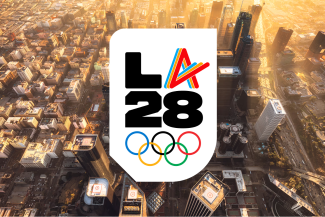Wrestling's Medical Professionals on Front Lines of Pandemic
Wednesday, April 22, 2020 - 13:41 By United World Wrestling Press

CORSIER-SUR-VEVEY, Switzerland (April 22) -- The wrestling community has always been larger than just its wrestlers on the mat. Today, as the sports fans, coaches, and administrators each "Stay Strong, and Stay at Home!" our sport's medical professionals are on the front lines battling the COVID-19 pandemic.
From all over the world wrestling's brave medical professionals are doing anything and everything they can to protect the lives of those in need during these unprecedented times.
"We are always grateful for our medical personnel, but I want us all to take an extra moment and celebrate their contribution and sacrifice," said United World Wrestling president Nenad Lalovic. "We are very proud of their efforts."

Dr. Babak Shadgan reviews his research project aimed at improving early diagnosis of COVID-19.
Dr. Babak Shadgan, the head of UWW Medical Commission and an Assistant Professor of orthopaedics at the University of British Columbia in Canada is leading a multi-center research project on development of a novel biosensor for screening and monitoring COVID-19 patients. Successful achievement by Dr. Shadgan and his research team will improve early diagnosis and treatment of patients affected by COVID-19.
Dr. Loukas Konstantinou, a trauma and sports orthopaedic surgeon in Greece and a member of the UWW Medical Commission is helping patients, including those infected by coronavirus.
“Our everyday work brings a high degree of vulnerability, concerning the contact with patients and citizens who are infected with the virus," said Konstantinou. "We take all the necessary steps to protect ourselves and our patients,” he said.

Dr. Szabolcs Molnar in surgery this month in Budapest.
Medical commission member Dr. Szabolcs Molnar exemplifies the dedication of medical professionals around the world. As an Assistant Professor of the orthopedics trauma for the largest hospital in Budapest, Molnar is working in the triage units and in the operating room. "I'm honored to do what I can to help my countrymen," he said.
The dangers of the virus are very real for front line workers. Medical commission member Dr. Sadegh Mahboubi had been treating patients in Iran throughout February and March before contracting COVID-19 himself. Most of the medical offices were closed so he stayed open and worked 18-hour days, but eventually had to rest after the disease affected his breathing.
"I didn't want a hospital bed occupied by me, so I was quarantined by my wife who is a doctor," he said. "If a wrestling match, I guess I lost to COVID, but I am back at work now to help."
Mahboubi says he lost 15 kilograms during his ordeal.

A recovered Dr. Sadegh Mahboubi in his office.
In the United States, a task force of former wrestlers, physicians and political leaders has been formed in an effort to create solutions for the sport's return to competition. The group is coming up with solutions for how to move into the next phase of life with the coronavirus still very much a concern. The working task force includes longtime wrestling physician Dr. Bernard Feldman and former Health and Human Services Secretary Tom Price.
Other members of UWW Medical Commission including Dr. Stevan Sikimic, a respirologist in Serbia; Dr. Stefan Strugarov, a surgeon in Bulgaria; Dr Klaus Johann, an orthopaedic surgeon in Germany; Dr. Abdelghani Chahi, a cardiologist in Morocco; Dr. Jose Padilha, a surgeon in Brazil; Dr. Kohei Nakajima, an orthopaedic surgeon in Japan; Dr. Mika Lehto, a cardiologist in Finland; Dr. Carol Maitre in France; Dr. Irina Dulepova in Russia; and Dr. Elena Abaeva in Uzbekistan are all helping patients at the high-risk front line.
"I've said before that our sport knows struggle and we know how to fight," said Lalovic. "I'm very proud of our medical professionals and look forward to seeing them again on the field of play."


Share your thoughts.
Comments